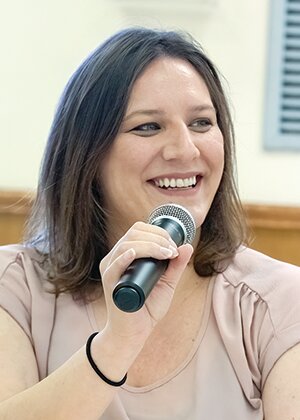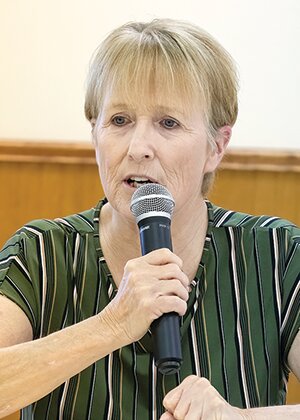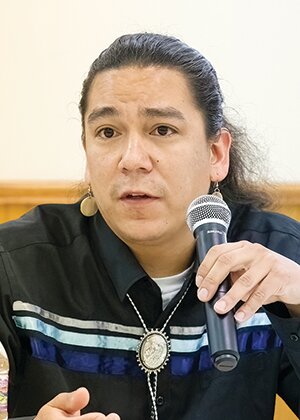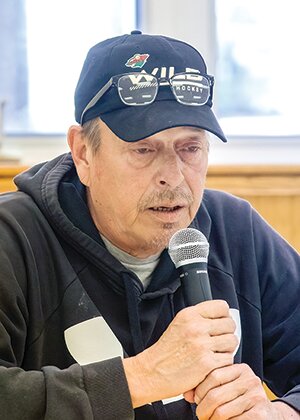Support the Timberjay by making a donation.
Tribal election set for Tuesday, June 11
ORR- The candidates for Bois Forte tribal chair and District One tribal council representative came together on Saturday at the Orr Community Center to discuss with band members what they hope to …
This item is available in full to subscribers.
Attention subscribers
To continue reading, you will need to either log in to your subscriber account, below, or purchase a new subscription.
Please log in to continue |
Tribal election set for Tuesday, June 11
ORR- The candidates for Bois Forte tribal chair and District One tribal council representative came together on Saturday at the Orr Community Center to discuss with band members what they hope to accomplish should they win in the June 11 tribal general election.
The format was less a debate and more an information forum for candidates to share their plans and visions for governance, as the candidates answered questions posed by moderator Jaylen Strong without directly responding to each other.
Incumbent tribal chair Cathy Chavers and challenger Hannah Lehti-Chosa joined District One hopefuls Edward Villebrun and Perry Drift for the event which was conducted in front of a small crowd and a larger audience listening in to the KBFT 88.9 FM radio broadcast.
As a two-term incumbent, Chavers had the advantage of political experience when formulating her responses to Strong’s questions, while the other candidates relied on their experiences with the band’s businesses, services, past practices, knowledge of broader issues, and feedback from interactions with potential constituents. Candidates were given three minutes to respond to questions, with the forum lasting almost two hours.
Lehti-Chosa was the first to respond to a question about candidates’ backgrounds for tribal leadership. She noted her experience as Director of Marketing at Fortune Bay Resort Casino, having steadily moved up the ranks through positions with increasing responsibilities.
“I’ve been working at Fortune Bay since I was 16, almost 20 years,” she said.
Lehti-Chosa noted that she has a bachelor’s degree in marketing and business management and has worked with the tribe in several different areas, including work with ISD 2142 and the Rock Ridge High School Indian Education program.
Chavers said that she has been working for the Band for over 40 years, starting at the Nett Lake post office in the mid-1970s. Along with experience in education, Chavers worked in health care for the tribe for about 30 years, she said.
“I’ve been involved in many of the departments on the reservation for many, many years in various capacities – budgeting, administrative supervision, meeting with outside agencies and going about and doing those types of things for tribal government and for the departments.”
Chavers, who also serves as the president of the Minnesota Chippewa Tribe, mentioned her experience working with local, state, and national committees on matters of importance to the Band. She noted, as well, that she is an elder, and while not possessing a college degree, she said she has learned a lot through the years that would benefit the Band through another term as chair.
Drift said he had worked for the Band for two years, and before that took college courses in Bemidji in insurance, business, macro- and microeconomics, and language before stepping away to provide for five children he cares for.
“But the more specialized knowledge I have that I feel can benefit the tribe is my affinity and yearning for creating language tools for small children that can help get our language back,” Drift said. “Language and culture is what I breathe. I also love business, I love numbers and statistics, I love knowledge in general.”
Villebrun, a past candidate for tribal council, has also served on the general election board. He noted his experience working with the school board, as a member of the conservation committee, and said he’s worked for the Band for most of his life.
When asked what each candidate planned to do for off-reservation band members, Villebrun said his priorities were addressing housing and homelessness and providing more services to children. He said the band should reserve money to help.
“I’ve heard that we don’t help off-reservation kids very much,” he said. “I want to look into that and try to help the kids out there.”
Drift also honed in on the issue of homelessness as a long-standing issue, while acknowledging that the financial costs of addressing the issue “would be kind of tremendous.” He said the band needed to be innovative and seize business opportunities that could benefit off-reservation members, while at the same time “not changing who we are.” Spiritual and cultural identity were themes Drift repeatedly came back to throughout the forum.
Chavers said she would like to expand the Band’s urban offices and also mentioned diversifying the band’s businesses as a way to fund more services for off-reservation members. She also said she’d like to have program directors go to the urban offices monthly to offer resources and provide services. She talked about providing for elders and using telecommunications technology to give off-reservation members more opportunities to participate in various Band committees.
“But you know, it all boils down to money,” she said.
Lehti-Chosa emphasized partnering with the state and pursuing grants to create off-reservation housing options, in addition to diversifying tribal businesses. She stated a need for improved communication overall, noting that often communication is lacking between the Vermilion and Nett Lake sectors, let alone to off-reservation members.
“It we’re not hearing it on the Vermilion side, I can only imagine how bad it is for off-reservation members,” she said.
Better communication would allow greater participation by off-reservation members in tribal programs, she said.
Strong asked the candidates to get more specific about their plans for economic development.
Chavers kicked off this round of answers by mentioning the Band’s new foray into the cannabis business. Noting that gaming revenue has plateaued, she emphasized building on what the Band has by more strongly promoting Fortune Bay as a tourist destination.
“We need to market our wild rice, we need to market who we are. That would be a great way to get people up here. This is God’s country,” Chavers said.
Chavers also touted government contracting as a way many tribes have developed revenue streams and provided employment opportunities. She noted that the Band would be getting revenue from its carbon tax credit program. And she said that the Band’s Johnson Lake property could be developed to be rented for corporate retreats. She also said that the Band’s culture and language should be involved in any developments the Band pursues.
Lehti-Chosa said that once the cannabis business starts making money, it could be used to revitalize the gaming operations, noting that they don’t have enough employees to keep everything running the way it should.
“Enhance the culture to attract more employees so we can improve our services, improve our amenities, and actually create that resort destination place that’s really what we’re there for,” she said.
Lehti-Chosa said she believes doing so will increase both gaming and resort revenue, which in turn will enhance all of the Band’s businesses and create more revenue streams and future business opportunities.
Drift also mentioned the cannabis business and said that the Band should not neglect the revenue that could come from non-cannabis items that are often sold in dispensaries, such as clothing items. He also agreed with promoting more tourism while respecting spiritual locations, with a strong infusion of culture and language that would make visitor experiences more appealing.
“Showing people and telling what a place signifies spiritually and how the old Anishinaabe thought could be really appealing,” he said.
Marketing will be important to the success of the cannabis business, Villebrun said, and he suggested that a dispensary should be placed where it will be seen and people will stop. And while it would be a significant investment, Villebrun said the hotel at Fortune Bay should be expanded, which would generate more revenue by allowing The Wilderness golf course to host big tournaments and perhaps even attract a PGA tour event.
When it came to the question of recruiting and retaining tribal citizens, the candidates echoed common themes of proving good jobs with good wages, focusing on the youth, enhancing workplace culture, and providing affordable housing options.
Strong asked how the candidates would stay accountable to resolutions, bylaws, and rules adopted by past tribal councils, and again general themes emerged that those things need to be researched and codified for ready knowledge about what those things are, and that many that are outdated need to be revised or eliminated. Drift said they should be assessed for their spiritual soundness.
“We’ve just got to really take a good look at what’s benefitting our people versus what’s hindering them from growing in any type of position or job that they’re in,” Drift said.
Candidates answered additional questions ranging from what they would do to impact future generations to what they would do to support elders, and from how they would incorporate more language and culture into tribal government to transparency about tribal finances.
The forum wrapped up with the candidates fielding a few questions from the audience and making closing statements in a final pitch for Band member votes.













